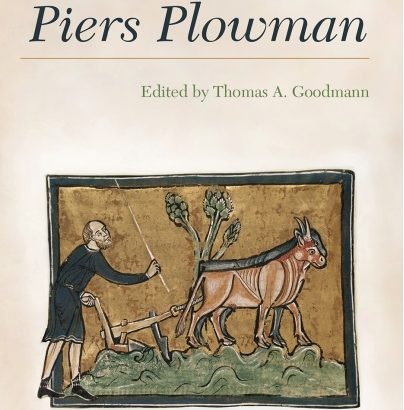The worst pandemic in European history, the Black Death, helped prepare the way for the first great flourishing of English literature not long after. How the first makers of modern literature responded to the traumas of their time can help us think about how to respond to the pandemic and injustice we continue to face.
Geoffrey Chaucer was a child in 1348-9 when the plague first struck England, killing up to half the people in some towns. His works refer to it obliquely. But his older contemporary, William Langland, confronts “pestilence” directly and implies that it shaped his decision to spend much of his life writing, revising, and expanding the long sequence of dream-visions known as Piers Plowman.
Medieval thinkers, including Langland, understood sickness theoretically as a divine judgment against sin—though the indiscriminate mortality of the Black Death also led them to start looking more at natural causes. The last episode of Piers Plowman, however, presses further into the social and spiritual effects of pestilence. Its satire of corruption seems more prophetic the further we live into our own pandemic. Langland exposes the most insidious dangers of any time of crisis—dangers that keep us from receiving what might be its hidden gifts.
Langland’s final action begins when the allegorical farm that represents flourishing society, under the spiritual leadership of Piers the Plowman, is attacked by Antichrist. The crop of truth is turned upside-down and its root tilled over. Falsehood springs up instead, gratifying people’s desires. Conscience, left in charge by Piers in his absence, calls together the “fools” who remain faithful and leads them in prayer to Kynde, a name for God as creator of the natural world. Kynde’s response is surprising: pestilence, including the symptoms of plague. When Conscience asks Kynde to stop and see if people will “amend,” the living are instead flattered by their good fortune. Fortune calls in Lechery, followed by Greed.
As our pandemic has begun to abate, we have seen people unsheltering as if fortune has returned. At the same time many others have taken to the streets to draw attention to more persistent social plagues. Langland’s agricultural allegory recalls the imagery of many Gospel parables but emphasizes a view of evil that is not so much personal as systemic. We still face the same evils in new guises, made more apparent by crisis: “post-truth” cynicism, contagious social media, populist demagoguery, flagrant individualism, predatory global capitalism, white privilege.
The situation becomes more personal to Langland’s narrator when Old Age, chasing after Life, runs him over. His wife even rues that “the limb that she loved me for” won’t work “at her will.” As he sees Death draw nigh, he cries out to Kynde for both deliverance and vengeance. “If you want to be avenged,” answers Kynde, “go into Unity…and learn some craft before you come out.” Unity is a barn that stands for a sort of ideal church, which the narrator enters through contrition and confession, the sacramental process of repentance.
Calling this stronghold Unity, however—before the Reformation, when there was only one church in England—suggests a deeper call to conversion. Being in unity requires embracing the fundamental reality of human equality and interdependence. As an answer to a prayer for vengeance, the call to unity and repentance urges reconciliation instead of blame, which requires turning from the desires that put us in rivalry with each other and confronting the injustices that have resulted.
But Unity fails. Here it happens through the undermining of the penitential process, a problem specific to late medieval Christian society. Yet we are familiar with this failure. It still comes from what undermines our own capacity, individually and together, for self-examination and repentance: strong incentives to bend the truth toward our own interests at the expense of others. We now have medical doctors to treat physical illness, but what do we need for what ails us spiritually, what alienates us from one another?
In the poem’s final lines, Conscience, forsaking Unity, resolves to become a pilgrim and seek Piers, who seems here to stand for holiness and wisdom unattached to institutional power structures. Conscience hopes Piers can “destroy pride.” I take this to be not just a personal sin but even more a collective complaisance, a confidence in any human group that sees itself as superior and constitutes itself by exclusion. To find a new unity, we may have to leave the old, or at least be a lot humbler about our communities. To seek Piers is to identify with the excluded.
Langland’s word for this comes earlier when the narrator asks Kynde: “What craft is best to learn?” Kynde replies, “Learn to love, and leave all else.” The current pandemic, by exposing the weaknesses of our society, taking away most of our usual ways of being together, and dramatizing our connectedness and the everyday sacrifices we can make for each other, forces us to be more intentional in loving—to begin again in learning the only craft that matters.
How do we learn? One way is literature itself, stories like Langland’s that aim to be more than entertainment on one hand or moral instruction on the other. Piers Plowman demands a deeper engagement with its enigmas. It pushes language to its limits in the face of mysteries human and divine, especially as known in times of affliction. It uses the literary resources of its time to invite us to imagine, feel, and consider how we love each other—and how we fail to.
Chaucer would use what he learned from Langland about social satire, perpetual pilgrimage, and genre-crossing stories in an even greater response to the fourteenth century’s series of traumas, The Canterbury Tales. These make for more playful reading during the pandemic, but nothing diagnoses our predicament and points to hope as truly as Piers Plowman.


